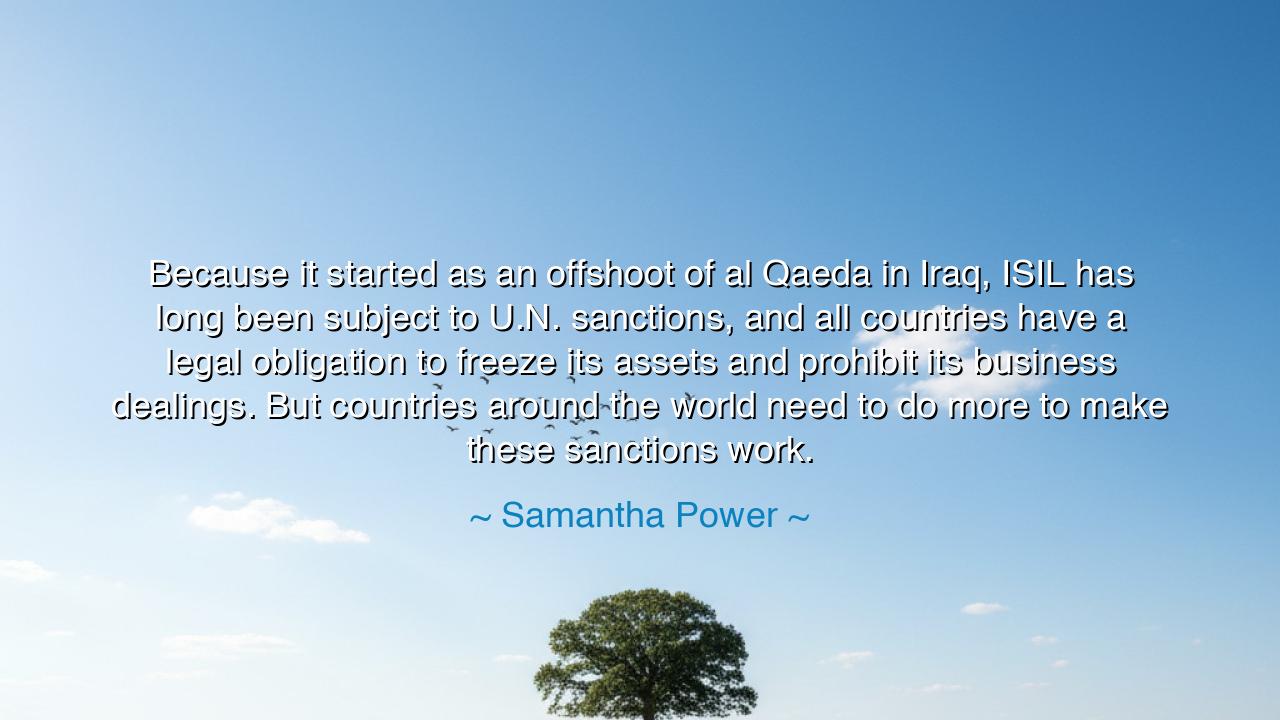
Because it started as an offshoot of al Qaeda in Iraq, ISIL has
Because it started as an offshoot of al Qaeda in Iraq, ISIL has long been subject to U.N. sanctions, and all countries have a legal obligation to freeze its assets and prohibit its business dealings. But countries around the world need to do more to make these sanctions work.






The words of Samantha Power resound with both authority and urgency: “Because it started as an offshoot of al Qaeda in Iraq, ISIL has long been subject to U.N. sanctions, and all countries have a legal obligation to freeze its assets and prohibit its business dealings. But countries around the world need to do more to make these sanctions work.” Within this statement lies a timeless principle: that law, while powerful, requires vigilance, enforcement, and the collective will of nations to transform authority into action. Sanctions, decrees, and obligations mean little unless accompanied by dedication, integrity, and cooperation.
The origin of this reflection comes from Power’s experience as a diplomat and advocate for human rights and international law. She observes that while legal instruments like U.N. sanctions are clear, their implementation often falters, undermined by negligence, political calculation, or gaps in coordination. ISIL, born from the chaos of Iraq and rooted in al Qaeda’s network, presents a case study in how legal frameworks, if not rigorously enforced, fail to curb the ambitions of violent actors. Power’s words are a call to action: law alone is insufficient; it must be wielded collectively and purposefully.
From the perspective of the ancients, this insight echoes the wisdom of the Greek and Roman statesmen who understood that decrees without enforcement were merely words on parchment. In Athens, laws against corruption or treachery were ineffective unless magistrates acted with authority and citizens adhered to them. Similarly, the Roman Republic’s decrees against conspiracies or rebellions were only effective when implemented rigorously, coordinated across provinces, and backed by vigilance. Power’s observation is a modern reflection of this enduring truth: the power of law lies in action, not in proclamation alone.
Consider the historical example of the League of Nations in the 1930s. While sanctions were imposed against aggressor states, the failure to enforce them collectively allowed violations to persist, ultimately contributing to the outbreak of World War II. Legal obligations existed, but the lack of unified action rendered them largely symbolic. Power’s warning mirrors this lesson: even in the contemporary era, the best-intentioned legal instruments — here, the U.N. sanctions against ISIL — can falter without coordinated effort, transparency, and political will.
Power emphasizes the moral and legal responsibility of all nations. ISIL’s financing, recruitment, and commerce thrive when any state neglects its obligations. Freezing assets and prohibiting business dealings are not mere procedural acts; they are duties enshrined in international law, essential to restraining a violent organization that threatens lives and security globally. The ancient philosophers would have seen this as the intersection of justice and duty: a society is only as strong as its willingness to uphold the principles it professes.
Her words also highlight the importance of collective action in enforcing justice. No single country can, in isolation, dismantle the financial and logistical networks of ISIL. Only through cooperation, information sharing, and consistent enforcement can the legal obligations imposed by the U.N. achieve their intended effect. This principle mirrors alliances in history — the Greek city-states, the Roman coalitions, and medieval leagues — which understood that unity multiplies the strength of law and policy beyond what any one actor could achieve alone.
The lesson is profound and enduring: law is a living instrument, empowered only through vigilant enforcement and shared responsibility. Legal obligations carry moral weight, and failure to act diminishes both justice and security. Power reminds us that international law, like all law, is only meaningful when accompanied by diligence, oversight, and cooperation, or it risks becoming an impotent symbol rather than a force for good.
Thus, the words of Samantha Power endure as counsel for generations: honor your legal responsibilities, act with vigilance, and collaborate with others to ensure that obligations are fulfilled. Freezing assets, prohibiting transactions, and upholding sanctions are not technicalities, but instruments of justice, protection, and moral duty. In this understanding lies the ancient and timeless truth: law is potent only when it is both acknowledged and enacted, transforming authority into meaningful and enduring action.






AAdministratorAdministrator
Welcome, honored guests. Please leave a comment, we will respond soon